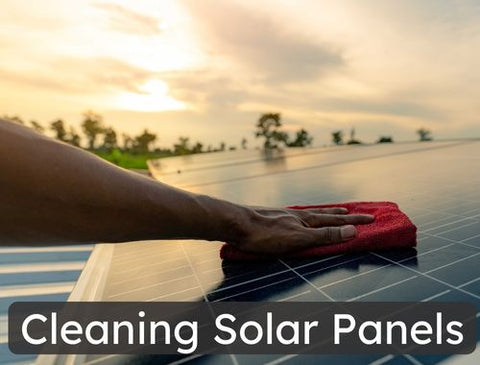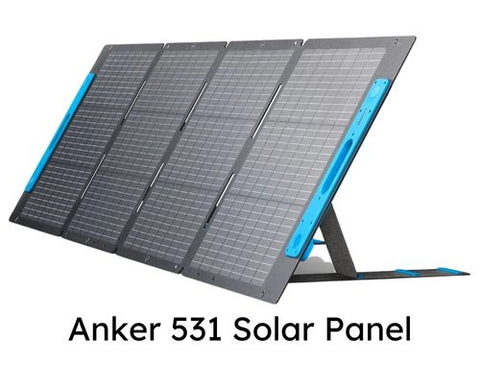
Cleaning Solar Panels is important because even though they're built to survive the environment, dirt, dust, and debris can accumulate on our solar panels over time and diminish their effectiveness.
When dirt and debris accumulate on solar panels, it can prevent sunlight from reaching the solar cells. This can lower the efficiency of the solar panel including the reduction of the quantity of power generated by the solar panels. In this article, we’ll cover the tools needed for cleaning solar panels, how to clean different types of solar panels, as well as the cost involved.

Can Rigid Solar Panels be Cleaned?
Yes, you can clean rigid solar panels. In fact, it is important to clean them on a regular basis to guarantee that they are performing optimally. Solar panels can become clogged with dirt, dust, and debris, reducing their effectiveness. Cleaning your solar panels might help enhance their production and lower your energy expenses.
Tools for Cleaning Solar Panels
There are a few basic tools that you will need to clean your solar panels. These include:
- A ladder or step stool
- A hose or bucket of water (including nearby water source)
- A soft cloth or sponge (or Squeegee)
- Soap(optional)
- Safety glasses
- Gloves
- Hat and sunscreen
How to Clean Solar Panels
Follow these procedures to clean your solar panels:
- Gather your tools and make sure everything is complete.
- Climb up to your solar panels using the step ladder (if needed).
- Remove any loose dirt or debris from the panels by rinsing them with water.
- If there is any stubborn dirt or grime, apply some soap waterto remove it.
- Use a Squeegee or sponge to make sure the dirt is removed properly.
- Make careful to thoroughly rinse away the soap.
- Using a soft cloth, dry the solar panels.
Cleaning Solar Panels on Rooftops
If your solar panels are on a rooftop, you must take extra measures when cleaning them. Wear safety equipment, such as a hard helmet and safety glasses, and take care not to slip or fall.
To begin cleaning rooftop solar panels, wash them down to remove any loose particles. Then, gently scrub the surface of the panels with clean water using a sponge. Finally, remove any residual water with a squeegee and allow the panels to dry.
Cleaning Portable Solar Panels
Portable Solar Panels that are compact and often brought on adventures get dust from outdoors and should be cleaned thoroughly to maintain continuous efficiency.
Begin by cleaning out portable solar panels using a microfiber cloth to eliminate any dust or dirt. Then, with the microfiber cloth, wipe the surface of the panels with just water or soap water. Do not use abrasive tools or strong chemicals, since these might harm the panels.
What Should You Take Care of When Cleaning Solar Panels?
Here are some things to remember while cleaning solar panels:
- Avoid using abrasive or harsh chemicals. These can cause harm to the solar panels.
- Take care not to damage the solar panels.
- After cleaning, properly dry the solar panels.
- Avoid washing the panels in hot weather or bright sunshine, since the water may evaporate too rapidly and produce stains.
- When working on a rooftop, exercise extreme caution and always adhere to established safety regulations.
Cost of Cleaning Solar Panels
The cost of cleaning solar panels varies based on the size of your system and where your panels are located. A professional cleaning service will often cost between $150 and $300. If, on the other hand, you are comfortable cleaning your own solar panels, you may save money by doing it yourself for little to no cost using common home products.
In terms of quality, portability, and efficiency, choose portable solar panels that are IP67 waterproof to ensure that all the parts won’t get damaged by water or rain, such as Anker 531 Solar Panel. Designed with maximum portability in mind, it is perfect for seaside or riverside camping, or any other activity that requires a reliable source of power. The solar panel itself is made from high-quality materials that are built to withstand even the harshest weather conditions.

Final Thoughts
Cleaning solar panels is important to ensure their optimal efficiency. While it may appear to be an overwhelming task, with the correct equipment and skills, it can be a quick and straightforward operation. Regular cleaning may help extend the life of your solar panels and keep them performing at their best. It is relatively cheaper and may not even cost you at all (since most items are mostly already in hand) to do the cleaning of the solar panels yourself.
FAQ
How often to clean solar panels?
The frequency with which you must clean your solar panels will be determined by a variety of factors, including the environment in which you are located and the quantity of dust and debris in the air that has accumulated on your solar panels, among others. In general, your solar panels should be cleaned at least once a year. If you live in a dusty or unclean environment, you may need to clean them more frequently. Clean portable solar panels as needed or whenever you detect dust accumulating on them.
Should I clean solar panels by myself or find professional help?
Whether you clean your solar panels yourself or hire a professional depends on your degree of comfort and the size of your installation. You may save money by cleaning your own system if you have a modest system and are comfortable doing it. If you have a big system or are not comfortable cleaning it yourself, you might consider hiring a professional. It is advised that rooftop solar panels be cleaned by a professional cleaning service to guarantee safety and correct cleaning procedures. You can clean portable solar panels yourself using common home products. Before you do, ensure you consult the manufacturer's guidelines to adhere to their warranty policies and maintain compliance.
Is it OK to clean solar panels with water?
Yes, cleaning solar panels with water is permissible. In reality, the most frequent and effective approach to clean solar panels is with water. Deionized or distilled water is the ideal choice for solar panel cleaning, as it effectively attracts and removes dirt and chemicals. This method ensures efficient cleaning, making your solar panels perform at their best.















